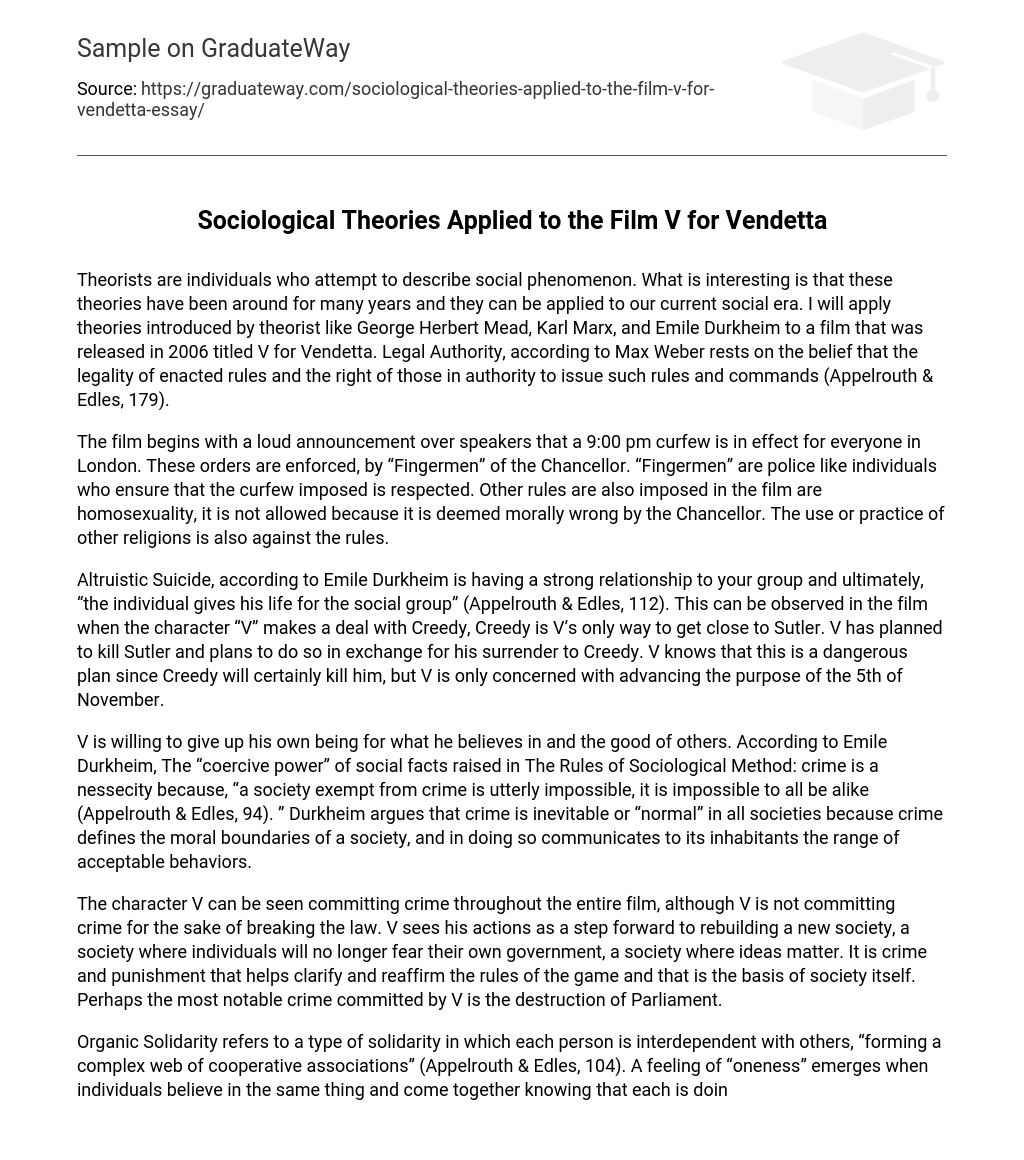Theorists are individuals who attempt to describe social phenomenon. What is interesting is that these theories have been around for many years and they can be applied to our current social era. I will apply theories introduced by theorist like George Herbert Mead, Karl Marx, and Emile Durkheim to a film that was released in 2006 titled V for Vendetta. Legal Authority, according to Max Weber rests on the belief that the legality of enacted rules and the right of those in authority to issue such rules and commands (Appelrouth & Edles, 179).
The film begins with a loud announcement over speakers that a 9:00 pm curfew is in effect for everyone in London. These orders are enforced, by “Fingermen” of the Chancellor. “Fingermen” are police like individuals who ensure that the curfew imposed is respected. Other rules are also imposed in the film are homosexuality, it is not allowed because it is deemed morally wrong by the Chancellor. The use or practice of other religions is also against the rules.
Altruistic Suicide, according to Emile Durkheim is having a strong relationship to your group and ultimately, “the individual gives his life for the social group” (Appelrouth & Edles, 112). This can be observed in the film when the character “V” makes a deal with Creedy, Creedy is V’s only way to get close to Sutler. V has planned to kill Sutler and plans to do so in exchange for his surrender to Creedy. V knows that this is a dangerous plan since Creedy will certainly kill him, but V is only concerned with advancing the purpose of the 5th of November.
V is willing to give up his own being for what he believes in and the good of others. According to Emile Durkheim, The “coercive power” of social facts raised in The Rules of Sociological Method: crime is a nessecity because, “a society exempt from crime is utterly impossible, it is impossible to all be alike (Appelrouth & Edles, 94). ” Durkheim argues that crime is inevitable or “normal” in all societies because crime defines the moral boundaries of a society, and in doing so communicates to its inhabitants the range of acceptable behaviors.
The character V can be seen committing crime throughout the entire film, although V is not committing crime for the sake of breaking the law. V sees his actions as a step forward to rebuilding a new society, a society where individuals will no longer fear their own government, a society where ideas matter. It is crime and punishment that helps clarify and reaffirm the rules of the game and that is the basis of society itself. Perhaps the most notable crime committed by V is the destruction of Parliament.
Organic Solidarity refers to a type of solidarity in which each person is interdependent with others, “forming a complex web of cooperative associations” (Appelrouth & Edles, 104). A feeling of “oneness” emerges when individuals believe in the same thing and come together knowing that each is doing their part for the good of the whole. In V for Vendetta, the clock striking midnight on the fifth of November is significant to the entire city of London because they place their differences and fear aside to come together.
This can be observed in the film, when men, women, and children of all different socio economic backgrounds, ethnic backgrounds and social orientation all come together dressed in V’s attire to stand against a Totalitarian London. George Herbert Mead teaches us that the “me” is the response of the individual to the attitudes of others (Appelrouth & Edles, 329). In V for Vendetta, the main character no longer has a self identity. We can see this as he is only referred to by the letter or Roman numeral “V. V also wears a mask throughout the entire film, he does not introduce himself as a man, but as a man in a mask. This is how people perceive him and he accepts that this is who he is. With Meads “I” can be viewed as V goes around London trying to pursue his goal of reliving the fifth of November. Karl Marx sums up communist as the abolition of private property (Appelrouth & Edles, 79). Capitol is not personal, but it is a social power. The entire film is dedicated to the abolition of parliament by way of the use of capitalism.
When V takes over the news feed and addresses all of London, he is calling them to action! He wants to reinvent how society is operated and allow everyone to be a part of the decision making process. Anti social behavior is having an understanding of rules and values and going against them. In V for Vendetta, Gordon Deitrich has a secret room in his home where he keeps all things banned by the Chancellor. We are able to see that he has a Koran and he confesses to Evey that he is also a homosexual. V’s behavior throughout the entire movie can be attributed to nti social behavior, he clearly understands the Chancellor is ruler of all London, yet his entire plan is to remove his power. The film V for Vendetta carries many social aspects that have been described by theorist many centuries ago. It is interesting to see how the past really reinvents and helps shape our future. It is through social interaction and social phenomenon that sociology thrives. Reference Page Appelrouth, Scott and Desfor Edles, Laura. 2008, Classical and Contemporary Sociological Theory. Northridge, CA: Pine Forge Press. McTeigue, James. 2006. V for Vendetta. Warner Brothers.





